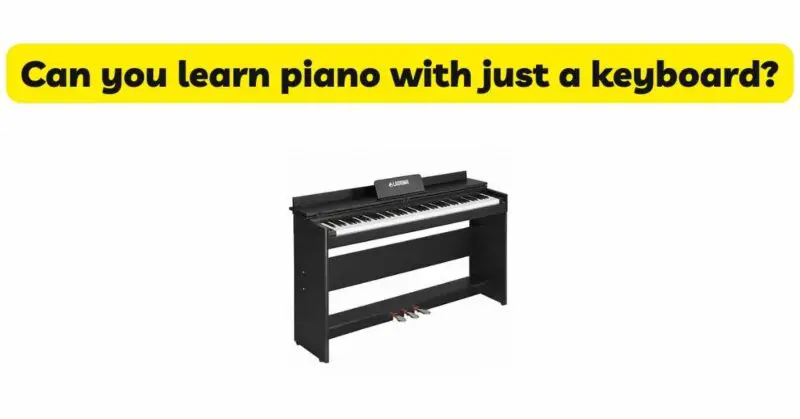Learning to play the piano is a journey that opens doors to creativity, expression, and a deeper understanding of music. While traditional acoustic pianos have long been the instrument of choice, modern technology has introduced digital keyboards that offer a convenient and accessible alternative. In this article, we will explore the feasibility and effectiveness of learning piano with just a keyboard, addressing the advantages, considerations, and potential challenges associated with this approach. With the right mindset, resources, and practice, learning piano with just a keyboard is indeed possible.
- Keyboards as Learning Tools: Digital keyboards have evolved significantly, offering features and functionalities that facilitate the learning process. Keyboards with weighted keys and graded hammer action aim to simulate the touch and feel of an acoustic piano, enabling learners to develop finger strength and control. Some keyboards even include touch sensitivity settings that allow players to adjust the response of the keys to their desired level. These features make keyboards suitable for practicing and developing fundamental piano techniques.
- Accessibility and Convenience: One of the primary advantages of learning piano with a keyboard is the accessibility and convenience it offers. Keyboards are typically lightweight, portable, and compact, making them easy to transport and store. This convenience allows learners to practice anytime and anywhere, without being limited by space or the need for a dedicated practice area. Additionally, keyboards often come with built-in speakers or headphone jacks, allowing for private practice without disturbing others. The accessibility and convenience of keyboards can contribute to regular practice and a flexible learning schedule.
- Cost Considerations: Financial considerations play a significant role when choosing an instrument for learning. Keyboards are generally more affordable compared to acoustic pianos, making them an attractive option for beginners or those on a limited budget. Entry-level keyboards offer a range of features and functionalities at a fraction of the cost of a traditional piano. This affordability factor allows aspiring pianists to begin their musical journey without the significant upfront investment associated with purchasing an acoustic piano. It is worth noting that as one progresses and gains more experience, investing in a higher-quality keyboard with advanced features can provide a more realistic playing experience.
- Learning Resources and Technology: Learning piano with just a keyboard is supported by an abundance of online resources, tutorials, and interactive learning platforms. Numerous websites, applications, and educational software provide comprehensive lessons, sheet music, and practice exercises tailored specifically for keyboard learners. These resources offer step-by-step guidance, theory explanations, and interactive tools to aid in learning. Additionally, keyboards can be connected to computers or tablets, allowing access to a wide range of music software, virtual piano lessons, and recording capabilities. The integration of technology with keyboards enhances the learning experience and provides learners with valuable tools to improve their skills.
- Technique Development: Developing proper technique is a crucial aspect of piano playing, regardless of the instrument used. While keyboards may not fully replicate the touch sensitivity of an acoustic piano, learners can still develop and refine their technique on a keyboard. Focus on hand position, finger placement, and proper posture remains essential. Paying attention to dynamics, articulation, and touch sensitivity even on a keyboard can contribute to the development of a solid technical foundation. Regular practice and mindful attention to detail can help learners progress and develop proper technique that can be applied to various piano-playing contexts.
- Expressiveness and Musicality: Expressiveness and musicality are integral components of piano playing. While acoustic pianos offer a wide range of tonal expression and nuances, modern keyboards have made significant advancements in sound sampling, aiming to replicate the sound of an acoustic piano. High-quality keyboards often provide a realistic piano sound, allowing for a certain degree of expressiveness and dynamic control. Additionally, keyboards often offer various instrument sounds and built-in features, enabling learners to experiment with different styles and genres, enhancing their musicality and creativity.
- Transitioning to Acoustic Pianos: One consideration when learning piano with just a keyboard is the potential transition to playing on an acoustic piano in the future. Acoustic pianos have a unique touch sensitivity and tonal qualities that may require some adjustment when transitioning from a keyboard. However, with guidance from an experienced piano teacher, learners can adapt and refine their technique to accommodate the nuances of an acoustic piano. Regular practice sessions on an acoustic piano, when available, can aid in the transition and further enhance the learning experience.
Conclusion: Learning piano with just a keyboard is a viable and effective approach, especially for beginners and those on a limited budget. Keyboards offer accessibility, affordability, and technological advantages that facilitate the learning process. While they may not fully replicate the touch sensitivity and tonal nuances of an acoustic piano, keyboards provide a platform for developing fundamental piano techniques, musicality, and expressiveness. With the wealth of learning resources available online, learners can access comprehensive tutorials, sheet music, and interactive tools to support their progress. Transitioning to playing on an acoustic piano in the future may require adjustments, but with consistent practice, dedication, and guidance from an experienced teacher, learners can successfully adapt their skills to different piano-playing contexts. Ultimately, the joy of learning piano lies in the dedication, passion, and commitment to practice, regardless of the instrument chosen.


